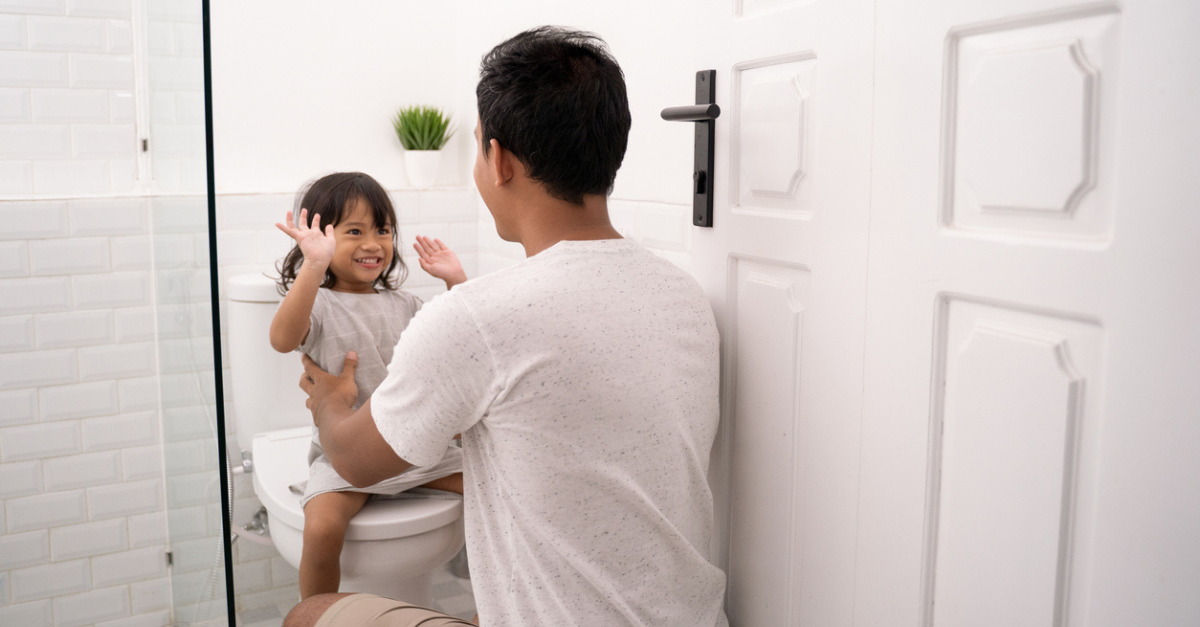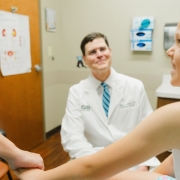Here’s the Scoop on Poop
By Shannon Suarez, MSN, APRN, CPNP
The first time you bring your child to see a urologist, you might be surprised to find we dive right into questions about your child’s bowel movements. Some examples are: How many? Is it hard? How often? Any difficulty? But many times our patients are there to discuss just urinary issues, so they get confused on the subject of those questions.
Most people don’t know about the connection between constipation and urinary problems. Even mild constipation can be the source of a significant urinary problem. Here are a few conclusions studies have arrived at:
- Children with recurrent urinary tract infections (UTI) are often constipated. When these children have their constipation treated, they get less UTIs.
- Children with bladders that spasm (which contribute to accidents) can correct after treating constipation.
- Vesicoureteral reflux (when urine backs up into the ureters or kidneys) is more likely to resolve if coexisting constipation is treated. If not treated, these kids also are more likely to have breakthrough UTIs and post-operative complications.
- Constipated children have a significant increase in the urine left in the bladder after urinating and dilation of the kidneys. These, in turn, contribute to UTIs.
- Some types of childhood urinary incontinence (leaking) and bed wetting can be corrected by constipation treatment alone.
Why Does Constipation Happen In Children?
Constipation occurs for a number of reasons. Some reasons include an unwelcoming bathroom experience (dirty bathrooms, lack of privacy, loud toilet flushing), past painful experience when passing hard stool, intentional holding because they don’t want to stop playing, poor diet, low water intake, lack of exercise, certain medications, and more. The biggest contributor I have found comes from lack of bathroom time in schools.
How Do You Know if Your Child Is Constipated?
This can be hard to assess. Particularly after a child is potty trained, it’s not necessarily common for mom or dad to spot-check every bowel movement. In most children, 1 or 2 easy-to-pass, soft bowel movements per day is acceptable. It is also important that they occur intentionally at socially appropriate times. This means that the child has control over when and where it happens. Talking to your child to understand their bowel pattern is a good place to start, but keeping a chart or diary of it for a few days is more helpful. Georgia Urology can provide you with one.
Constipation can at times be treated with diet and exercise. Increasing water intake, decreasing juices and milk products, increasing dietary fiber, and keeping more physically active. Foods like bananas, white bread and rice, fast food, typical snacks like chips, processed foods like hot dogs or microwavable meals will contribute to constipation. However, foods like fresh fruits and vegetables, whole grains, beans, and nuts have tons of fiber to help get things moving. When diet and exercise fall short of improving your child’s constipation, medications in the form of probiotics, fiber, laxatives, or stimulants may be added.
Questions About Constipation in Your Child
Now, let’s get to some of the most common scenarios I see in the office:
I am certain my child has a bowel movement every day. It’s not constipation.
Sometimes, children can go every day but they are not fully emptying their colon, unbeknownst to them. This is the kind of thing usually seen only on Xray. Adopting a “sitting time” (on the toilet) after dinner and using a stool under their feet can encourage more complete emptying.
I know my child doesn’t have hard stool because I see smears of it in their underwear.
Chronic constipation can often lead to this sort of thing. It stretches and weakens the rectal muscles leading to the leaking of stool without their awareness. Seeing smearing can actually mean your child’s constipation has been going on for quite a long time.
My child has a bowel movement every few days but that’s just his norm. It’s not constipation because he’s always been this way.
Constipation can begin very early in life and go on for years and years. Proper bowel management from everyone involves a daily bowel movement.
My pediatrician suggested constipation medication before. We tried it for a few days, and it didn’t work for us.
A large portion of these types of medications requires a few weeks to see real success. They are usually evaluated over the course of several months.
Key to Success
The most important part of resolving your child’s constipation is that you take a family-approach to this:
- Children and teens need your help to drink more water, resist the wrong foods, stay on top of a bathroom schedule, and remember to take their medications every day.
- Encourage them to keep a diary or to talk to you about how their body is responding to treatment. This will help our providers know what’s working and what needs changing.
- Support them by encouraging siblings not to tease them and resist scolding them when they fall short of your expectations.
- Loop their schoolteacher in so your child has freedom to use the bathroom when needed. Georgia Urology can provide you with a letter for this. Resolving constipation allows our providers to move on to the next step of treatment for your child’s urinary problem.
To make an appointment with Georgia Urology’s pediatric team, schedule online or call one of our office locations.
References
National Institute of Diabetes and Digestive and Kidney Diseases. Retrieved from https://www.niddk.nih.gov/health-information/digestive-diseases/constipation/eating-diet-nutrition
Nationwide Children’s. Retrieved from https://www.nationwidechildrens.org/family-resources-education/700childrens/2014/07/why-we-talk-about-poop-for-a-peeing-problem
Texas Children’s Hospital. Retrieved from https://www.texaschildrens.org/blog/2015/03/childhood-constipation-101-commonly-asked-questions-part-one
UCSF Benioff Children’s Hospital Oakland. Retrieved from https://www.childrenshospitaloakland.org/main/constipation-and-urologic-problems.aspx








